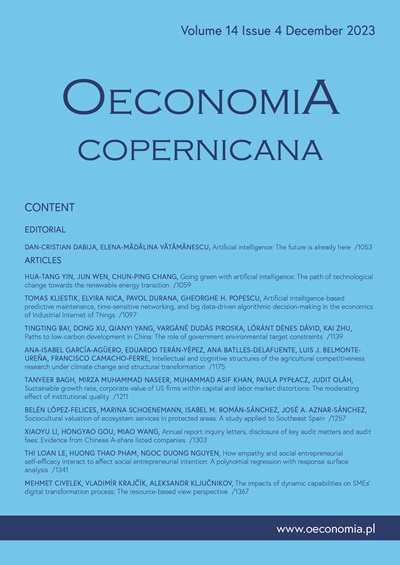中欧国家中小企业员工情绪智力和伦理对知识共享的影响
IF 10.8
1区 经济学
Q1 ECONOMICS
引用次数: 42
摘要
研究背景:本研究考察了情商和道德对组织内部知识共享的影响。它考察了情商对个人道德行为的影响。重点是在中小企业部门工作的个人。问卷调查被认为是进行这项研究的最合适的方法。该研究基于从三个国家(捷克共和国、匈牙利和斯洛伐克)收集的1162份回复。本文的目的:本文的目的是研究知识共享、伦理和情商之间的关系。此外,还考察了影响情商的受访者的国籍、性别、教育程度和年龄。另一个目标是探索影响员工行为的因素。方法:我们确定了四个假设。为了检验这些假设,我们使用了方差分析和逻辑回归。选择AES量表来评估EQ,该量表由33个项目组成。将获得的结果与结构化访谈得出的中小企业所有者的意见进行了比较。调查结果和附加值:大约20%的企业没有使用任何激励工具来启动员工的知识共享。沉默知识最常见的原因(47.2%)是什么?缺乏欣赏?没有出现在公司所有者的回答中。根据员工的认知,性别对情商水平有影响,而国籍、教育程度和年龄组对情商没有影响。中小企业主不太重视性别。不道德行为的发生并不取决于企业的规模。员工认为,情商对知识共享有积极影响,但不受道德规范的影响。大多数业主也同意EQ的积极影响。员工和业主在不同方面的态度不同。研究结果表明,性别在EQ中起着重要作用。对这一复杂问题的研究为V4国家奠定了经验基础。本文章由计算机程序翻译,如有差异,请以英文原文为准。
The effects of emotional intelligence and ethics of SME employees on knowledge sharing in Central-European countries
Research background: The research examines the impact of emotional intelligence and ethics on knowledge sharing within organizations. It examines the impact of emotional intelligence (EQ) on the ethical behavior of the individual. The focus is on the individuals working in the SME sector. A questionnaire survey was considered the most appropriate technique to conduct the research. The study is based on 1162 responses, collected from three countries (the Czech Republic, Hungary and Slovakia).
Purpose of the article: The aim of this article is to examine the relationship between knowledge sharing, ethics and emotional intelligence. Furthermore, nationality, gender, education, and the age of the respondents influencing EQ are also examined. The additional goal is to explore the factors that influence employee behavior.
Methods: We identified four hypotheses. To test these hypotheses, we used variance analysis and logistic regression. The AES scale was chosen to assess EQ, which consisted of 33 items. The results obtained are compared with the opinion of SME owners resulting from structured interviews.
Findings & value added: About 20% of enterprises are not using any motivation tool to initiate knowledge sharing of their employees. The most common (47.2%) reason for silencing knowledge ? the lack of appreciation ? did not appear among the answer of company owners. According to the employee perceptions, gender has impact on the level of emotional intelligence, while nationality, education and age group have no impact on the EQ. SME owners do not address much attention to gender. The occurrence of unethical behavior does not depend on the size of the enterprise. According to employee opinion, the EQ has positive impact on knowledge sharing, while it is not affected by ethics. The majority of owners also agreed with the positive impact of EQ. The attitude of employees and owners differ in different aspects. The results have shown that gender plays an influential role in EQ. The research of this complex problem laid down the empirical foundations for the V4 countries.
求助全文
通过发布文献求助,成功后即可免费获取论文全文。
去求助
来源期刊

Oeconomia Copernicana
ECONOMICS-
CiteScore
13.70
自引率
5.90%
发文量
26
审稿时长
24 weeks
期刊介绍:
The Oeconomia Copernicana is an academic quarterly journal aimed at academicians, economic policymakers, and students studying finance, accounting, management, and economics. It publishes academic articles on contemporary issues in economics, finance, banking, accounting, and management from various research perspectives. The journal's mission is to publish advanced theoretical and empirical research that contributes to the development of these disciplines and has practical relevance. The journal encourages the use of various research methods, including falsification of conventional understanding, theory building through inductive or qualitative research, first empirical testing of theories, meta-analysis with theoretical implications, constructive replication, and a combination of qualitative, quantitative, field, laboratory, and meta-analytic approaches. While the journal prioritizes comprehensive manuscripts that include methodological-based theoretical and empirical research with implications for policymaking, it also welcomes submissions focused solely on theory or methodology.
 求助内容:
求助内容: 应助结果提醒方式:
应助结果提醒方式:


